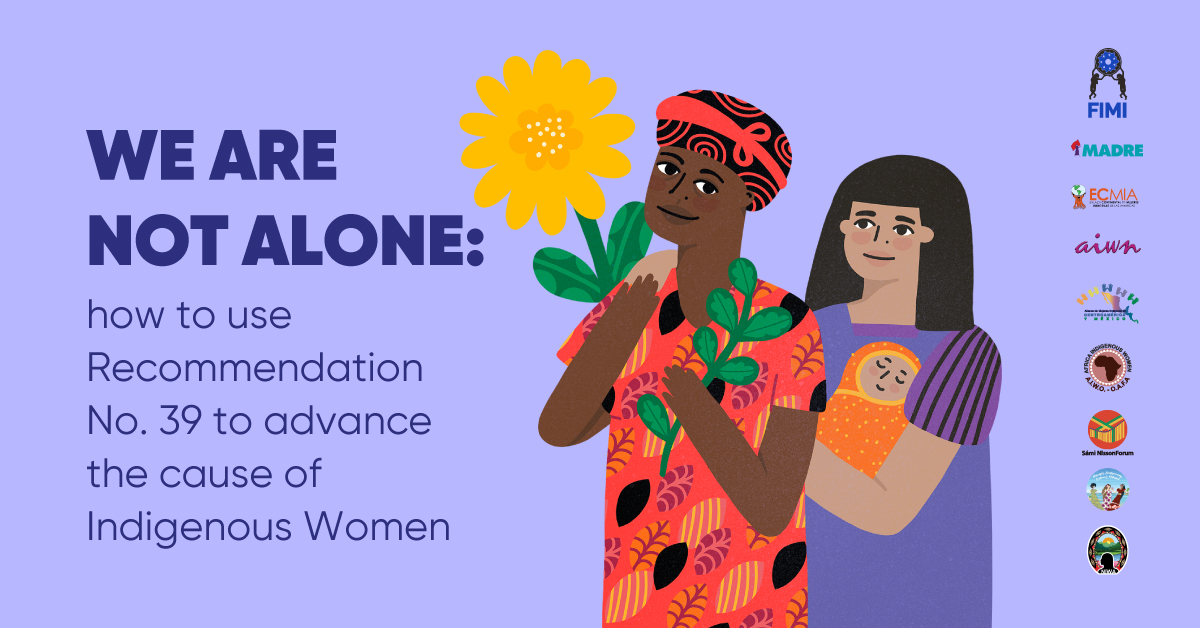
It is important to disseminate the General Recommendation on the Rights of Indigenous Women and Girls through different means; to approach the different levels of governments with its legal backing and take into account both for urgent issues as well as for more in-depth demands.
At a warm and meaningful reunion, we interviewed Gladys Acosta Vargas, chairperson of the CEDAW Committee, on the General Recommendation on the Rights of Indigenous Women and Girls. Gladys, who has been an ally of the Indigenous Women movement for many years, explained that it is a process to construe the Convention articles and their binding force. Upon its adoption, the interlocution capacity will be broadened between the Committee and the State Parties for their compliance with their international obligations to the indigenous communities. In this context, Acosta Vargas explained: “General Recommendations do not add any rights, as these are included in the Convention, but they go deeper on how they must be protected.”
According to Acosta Vargas, for a Recommendation to be effectively applied, it is required to disseminate it in all possible ways: languages, codes, images, videos. The dissemination must take into consideration persons with disabilities, who need to find out about the progress achieved in terms of Human Rights. During our conversation, she pointed out that not only should State Parties take part in the dissemination of content, but also civil society NGOs and mass media, whether public or private.
In addition to protecting Indigenous Women and Girls who live within their territories, the countries must also protect those who are in transit (due to migration or for any other reason), because it is a right.
For Acosta Vargas, achieving changes means taking action before the State branches. On one hand, the Executive branch, because all public policies of all areas are drafted there, and before the Legislative and Judicial branches, which complement it. On the other hand, before the regional and municipal governments, as they are directly responsible for changes at a local level.
As an example of the possible actions, she explained that, in case of violation to the rights of Indigenous Women, the CEDAW and the specific articles of the General Recommendation should be cited, explaining what Indigenous Women experience in their daily lives and their struggles. Thus, in any controversy or dispute, even with private parties, the State will ensure that their rights are not violated.
Regarding this type of actions, Acosta stated: “The Convention is growing stronger, thanks to the women’s fights, because its strength does not arise from it, but from those who use it and turn it into an instrument of struggle.” As they are directly applicable standards, the protection organizations, including Indigenous Women organizations, must learn how to use them in their long term and immediate fights.
The chairperson of the CEDAW Committee considers that the adoption of such General Recommendation responds to a debt that the world owes to Indigenous Women and Girls for the atrocities they have suffered.
This Recommendation is emerging and was developed in spite of the hard work during the pandemic. “The dialogue started in 2017 and we are about to adopt it in 2022, because it responds to the increasing struggle for a greater visibility of Indigenous Women and Girls in the field of international politics,” she added.
To close the interview, Gladys Acosta highlighted that the Recommendation provides for the connection with nature, the respect to human beings and a powerful spirituality not only for Indigenous Peoples, but also for everyone. As such, this instrument will also be useful to defend our territories from violence and dispossession.
“One thing is to fight knowing that rights are on your side, and another thing is to keep fighting simply because an injustice is taking place,” Acosta Vargas expressed. Finally, our voices are beginning to be heard.




